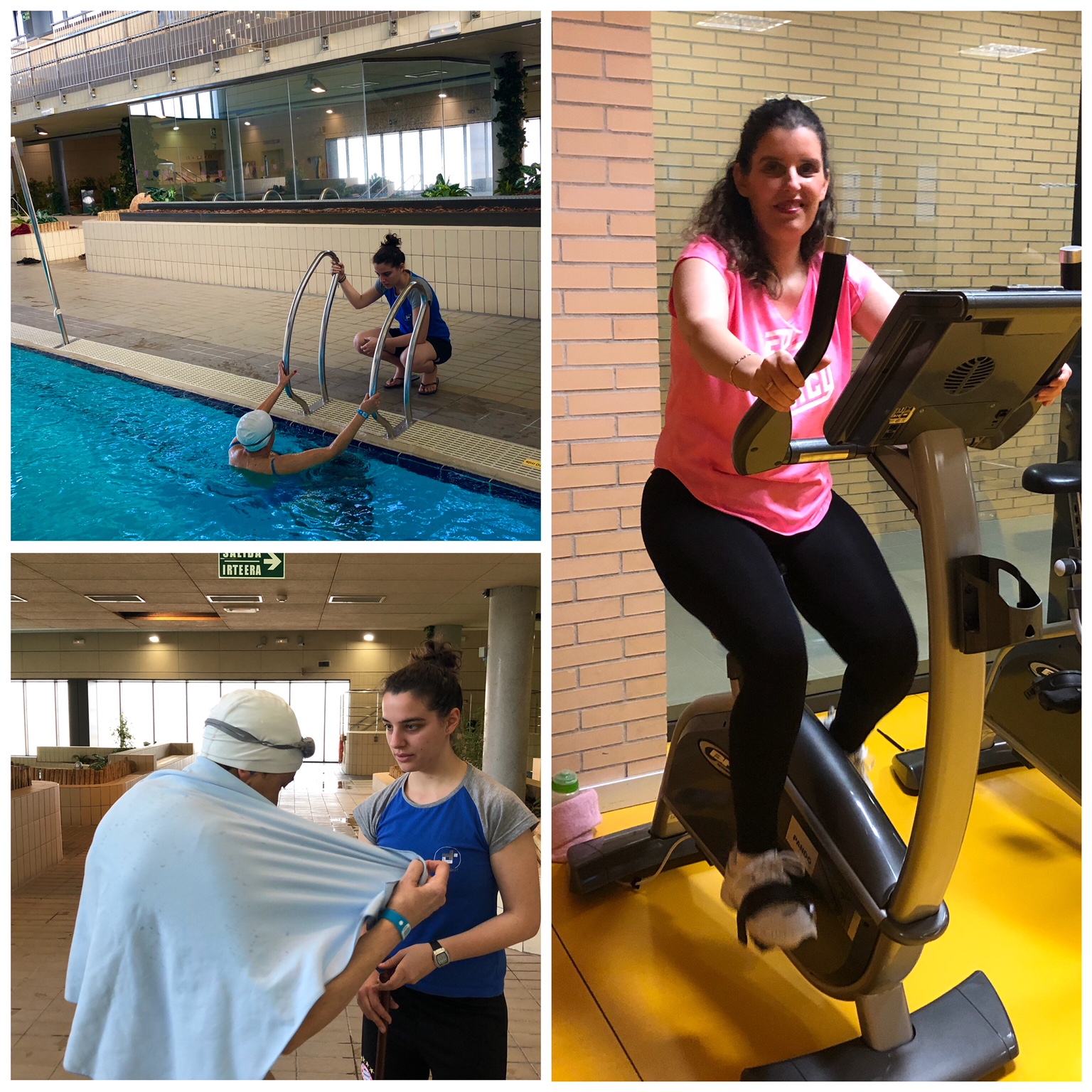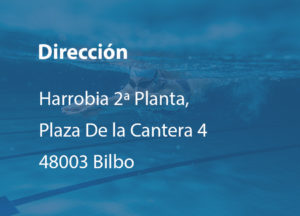

-
Gloria lives with Multiple Sclerosis: “I couldn’t go swimming without GaituzSport integral changing room and companion support service”.
-
Mónica has Steinert’s syndrome and takes part in the inclusive programme fostered by GaituzSport, doing activities in conventional physical activity groups: “I feel integrated and happy, plus I’ve improved mentally and physically”.
-
Doing physical activity and/or sport is a priority factor in prevention, treatment, rehabilitation; and as such improves our health.
What do Gloria and Mónica have in common? They are both women living with chronic neurological diseases, i.e. multiple sclerosis and Steinert’s Syndrome respectively, who have discovered doing physical activity and sport to be a motivation for improving their quality of life.
Gloria and Mónica take part in the Portugalete inclusive development plan, launched by the Town Council. The main of this programme fostered by GaituzSport, with the collaboration of BBK, is to foster and facilitate the practice of physical activity and sport among the abled and disabled in equal conditions.
 GaituzSport Integral Support Service
GaituzSport Integral Support Service
GLORIA MARTÍNEZ was diagnosed with Multiple Sclerosis (MS) over 20 years ago. MS is a chronic neurological disease, which affects women more than men, and is the second cause of disability among young adults after traffic accidents.
Gloria is a user of our integral changing room and companion support service for physical activity, in this case swimming, at the Pando-Aisia Sports Centre.
She has always been very active and sporty since she was a child, chiefly swimming and hiking. Gloria told us that 5 years ago, “I had a very strong episode of the disease and I was almost unable to walk”. She began recovering gradually and managed to overcome the episodes, although with some sequelae like the lack of movement in one arm, which prevents her from changing clothes by herself.
Gloria admitted that, “I wouldn’t be able to go swimming, without this support service”. The instructor helps me change in the changing room as well as getting in and out of the pool. Mind you, once in the water she feels totally independent, free and happy. “In the pool, I’m just like everybody else who comes to swim…And I can feel greater physical and mental well-being day by day”.
“We didn’t know this possibility existed, and then when the Sports Centre informed us and put us in contact with the GaituzSport technical area manager, it was great news”, said Gloria and her husband Francisco García, a man with great sensitivity, comprehension love for his wife. “We’re a team”, and I added that they were a veritable example of how to adapt and still enjoy life.
For Gloria “it’s a service we give a 10 to, a useful programme which we recommended to everyone with any kind of illness, which impedes them doing physical activity due to lack of support.”
The disease cannot be an “excuse” to stay at home on the sofa, Gloria stated, and encourages everyone to do any kind of activity within their possibilities, “because of how it improves your quality of life, physical health and how you feel. When I finish my swimming session, I feel happy and more motivated”.
Ainara Arribas is the GaituzSport instructor who provides Gloria’s support service, and they understand each other “perfectly”. “Without this support service Gloria would be unable to do the physical activity she enjoys most, namely swimming.”, Ainara stated, highlighting that since she began this activity, “Gloria has greater autonomy, has improved physically and feels more active and with a better mood”…”It gives you a lot of satisfaction knowing you’re doing a useful job.”
 Inclusive physical activity
Inclusive physical activity
MÓNICA PÉREZ was diagnosed with Steinert’s Syndrome at 16. It is a rare, hereditary degenerative pathology affecting mainly the muscles. The disease causes co-ordination problems and a loss of strength in hands, although luckily it progresses slowly.
She started doing physical activity on doctor’s orders. Mónica sought advice from GaituzSport in January 2017, and thanks to the revision of intervention methodology and specific supports, we have achieved Mónica’s inclusion, taking part in conventional physical activity groups at Pando-Aisia Sports Centre. Furthermore, since she started she has not looked back: swimming, Zumba and has now started what she considered a “challenge”, i.e. spinning classes.
“At first I found it very hard, but now I come 2 times a week; and the day before, just preparing my bag makes me happy”, Mónica confessed with a big smile.
From a physical standpoint she feels better and her neurologist says the same at each check-up. Above all “I have less cervical vertebra pain and less stiffness.” And from an emotional standpoint she feels integrated, “I have a great relationship with the whole group, and I have a good time.”
“I would encourage everybody to move, although admittedly it’s an uphill slog at first… Mind you, once you start, you feel so good, you get hooked,” Mónica concluded.
Health is a basic right and it is everybody’s responsibility. According to the WHO definition “a state of complete physical, mental and social well-being, not merely the absence of illness or disability.” Doing physical activity and/or sport is a priority factor in prevention, treatment, rehabilitation; and as such improves our health.
Gloria and Mónica are two clear examples of the benefits it provides health with, and how sport is a social inclusion channel.
Disease does not “stop” them from being able to practise and share their physical activity, integrated with everybody. Their testimonies motivate and encourage us to continue with our work, facilitating access to sports for everybody and as always at GaituzSport, from an inclusive perspective.
ABOUT STEINERT’S SYNDROME
- The main symptoms of Steinert’s Syndrome, a hereditary disease considered rare, are related to the: muscles, eyesight, cardiovascular system, central nervous system, digestive system and gonads (male and female sex glands). Myotony the cardinal symptom of the disease, and is manifest in some muscle groups and in others (face and neck, feet and forearm dorsiflexors) atrophy and muscle weakness (muscular dystrophy) generally predominate).
- At present there is no cure for this disease; however, it is being treated with several drugs and/or technical means whose aim is to improve the patient’s quality of life.
- The practice of some kind of physical and physio-rehabilitation activity provides the patients with Myotonic Dystrophy (DM1/DM2) with well-being.
(Source: Spanish Federation of Neuromuscular Diseases).
MULTIPLE SCLEROSIS DATA, a capricious enigmatic disease
According to the Spanish Neurological Society (SEN) data:
- 2,500,000 people have MS worldwide and approximately 47,000 in Spain.
- MS is usually detected between the ages of 20 and 40, affecting more women than men. It has a great family, labour and social impact, because it occurs during the most productive stage of people’s lives.
- It is incurable since to date no cure has been found; however, there are treatments which alleviate the symptoms and in many cases stop it from evolving, thereby reducing the number of episodes.
- Staying active as far as each person is able helps the patient have a better quality of life besides improving his/her physical and mental health.


